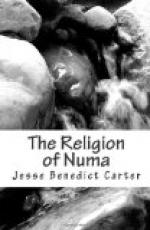And so the Romans adopted the Greek gods of the dead, and thus, at least theoretically, put their dead ancestors into subjection to the Greeks just as they themselves, the descendants, were sitting at the feet of the Greeks in this life. But though the enactment of the Senate gave these gods Roman citizenship, and the priests of the Sibylline books were in duty bound to perform the ritual of the cult, be it said to the credit of the Romans, the gods themselves never took a very deep hold of the religious life of the people in general. Their names, to be sure, crept into a few of the old formulae and stood side by side with the older deities, and Proserpina was made much of by the Roman poets; but the real tests of devotion, dedicatory inscriptions, are almost entirely absent. Strangely enough the only thing which seems to have caught their fancy was the weird ritual of the nightly sacrifice at the Tarentum, and especially its repetition after one hundred years. This idea of the hundred years is Roman rather than Greek, and it is at least open to question whether it may not have been added to the instructions in the oracle to give the whole matter an added Roman colour. Thus in B.C. 249 were instituted the Secular Games, which were repeated with approximate accuracy in B.C. 146, and would doubtless have been again between B.C. 49 and 46, had not the Civil War completely filled men’s minds and made human sacrifices to the dead, in battle, an almost daily occurrence. Meantime the Roman annalists were working backwards in their own peculiar fashion, and building out into the past a series of fictitious celebrations preceding B.C. 249, one hundred years apart, back into the time of the kingdom. On the other hand we shall have occasion later to speak of the restoration of the games and their reorganisation by Augustus.
Under the test of adversity nations are very much like individuals, and a national weakness, which is often entirely concealed in normal conditions, comes prominently and disastrously to the surface in the hour when strength is most needed. The war with Hannibal was just such a crisis in Rome’s history, and under its influence Rome’s dependence upon the Sibylline books was more pronounced than ever. The seeds of superstition sown during the earlier centuries burst now into full blossom, destined to produce the fruit, the gathering of which was to be




